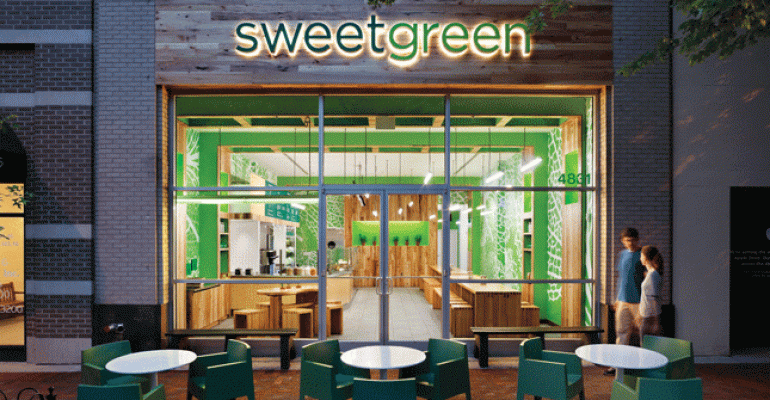Financial advice firm Morningstar’s recent search for new restaurant industry investment ideas took it to the fast casual segment, and it discovered some good candidates while there. Along the way, it also found that fast-growing chains share similar traits—ones that any operator can adopt.
The report, “Finding Restaurant Investment Ideas as Traffic Slows,” looked at what Morningstar dubs “emergent” fast-casual chains. For its investor clients, this meant chains with more than 10 units and an average unit volume of $1.6 million, reaching these thresholds in a relatively short period of time.
Fast-casual standout Shake Shack easily met these criteria. But Morningstar’s access to data and information from non-publicly held firms is what gives its findings a unique perspective. Here are things emerging fast casual chains are doing that drive traffic today and should keep doing so during what Morningstar cautions will be a “potentially more challenging consumer spending environment” ahead.
• They foster a comprehensive consumer value proposition that spans more than just price, including convenience, flexibility, employee training and restaurant design.
• They adapt to evolving views on healthier eating by establishing authenticity to accommodate a better-educated consumer, developing a menu that is flexible enough to accommodate multiple dietary preferences and finding ways to balance healthiness with convenience and profitability.
• They maintain a scalable supply chain.
• They find ways to connect with consumers beyond the four walls of the restaurant, such as embracing technology to foster brand loyalty, using innovative approaches to marketing, expanding delivery and catering options, and migrating intangible brand assets to new channels.
Morningstar took a close-up look at several emerging chains to see what makes them tick. It found the most to love at 55-unit Sweetgreen, giving it high marks for selling healthful food to a mass audience that is looking for a lot more than just a good-for-you experience.
Sweetgreen COO Karen Kelley told Morningstar how the company pulls it off.
“She pointed out Sweetgreen’s emphasis on cooking every order from scratch, its use of fresh produce through daily produce deliveries and local sourcing, and its implementation of an intriguing seasonal menu rotation that changes five times a year to better capitalize on produce trends in each of the company’s different markets.
Morningstar’s assessment of this approach? “We believe this is an effective way to efficiently infuse menu innovation while still allowing consumers to get better accustomed with the core menu and ordering process.”
Thirteen-unit Los Angeles-area Mendocino Farms also drew praise. The chain’s upscale strategy has enabled it to post a $3.2 million average unit volume—$700,000 higher than that of Panera Bread.
What’s it doing right?
“In our view, Mendocino Farms has positioned itself as the definitive example of the upscale fast-casual concept, combining the counter ordering of a limited-service restaurant with table delivery, a full beverage offering, and the ambiance of a modern full-service chain,” Morningstar notes.
“The company meets the criteria for what we think consumers are looking for in a fast-casual concept, including a balanced menu accommodating both healthy/better-for-you preferences and more indulgent fare, an intuitive ordering system and fast-moving lines (which we partly attribute to high employee hiring and training standards), and ‘urban industrial’ restaurant aesthetics, which goes a long way toward explaining its already-impressive average unit volume.”
There are several well-run regional fast casual pizza chains, but Morningstar singled out 150-unit Blaze Pizza. Average unit volumes — 2.5 million for company stores, $1.5 million for franchises — lead the category.
Morningstar praises this chain’s “efficient assembly-line preparation process that gives consumers control over orders without sacrificing service speed, owing to high-speed ovens that can prepare pizza in less than three minutes; an intriguing combination of set menu items, in addition to a custom-built option with unlimited toppings at an accessible price point ($8 per pizza); better daypart balance than many rival fast-casual chains, split roughly evenly between lunch and dinner; and a compelling assortment of beverages, desserts, and other potential add-on products.”
Investors can’t buy into these three privately held companies at the moment. Instead, Morningstar advises, they should put money into Starbucks and Panera Bread. “They have best adapted to consumers’ changing expectations about convenience, healthy eating, supply-chain transparency, and mobile technologies. These are also the companies that have enjoyed the most success connecting with consumers outside the four walls of their restaurants through enhanced loyalty programs, growing consumer packaged goods businesses, and new channels of distribution, such as delivery.”
Many of the successful practices Morningstar identified can be adopted by restaurants of any size, type or scale. If your traffic and sales have been sluggish of late, you might want to give some of them a try.





